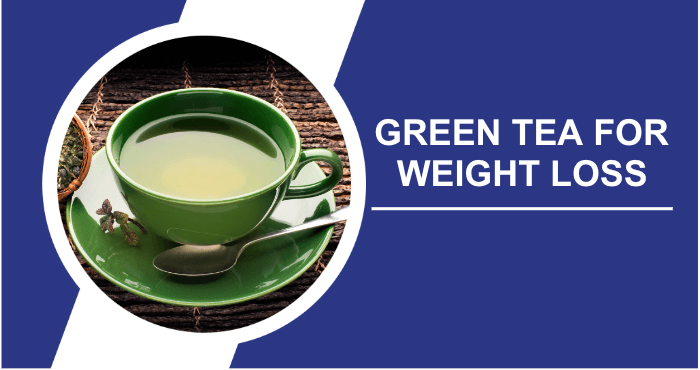While it recently gained massive popularity in the United States, green tea has been historically used in ancient Chinese medicine to treat several conditions, from stomach aches to headaches and wound healing. Green tea has many health benefits because of its rich antioxidant and nutritional value, including weight loss.
Green tea contains specific molecules that play a key role in regulating our body’s metabolism and promoting fat burning, ultimately helping to eliminate stubborn belly fat. Keep reading to learn more about the science behind green tea’s effect on weight loss and to determine the optimal amount of green tea needed to lose weight.
Can Green Tea Help With Weight Loss?
Many research studies have found consensus on the benefits of consuming green tea, whether in the form of brewed tea or using supplements like green powder blends. These studies suggest that regular tea consumption can have positive effects on reducing body weight and waist circumference. Additionally, it has been observed to aid in regulating metabolism and lowering both blood pressure and fasting glucose levels.
One particular study found that a minimum of eight weeks of green tea consumption was required to see significant weight loss effects. Interestingly, green tea shows its most potent weight loss properties when consumed at lower doses – less than 800 milligrams per day. Some studies even suggest that a daily dose of less than 500 milligrams of green tea produces the most effective weight loss results.
Where Does Green Tea Traditionally Come From?
Green tea traces its roots back to the serene landscapes of China and Japan. In these societies, the knowledge of cultivating and brewing tea was handed down from one generation to another forming a tradition that honors the subtle flavors and wellness advantages of this calming drink. In today’s world green tea is widely cherished for its fascinating past and inherent health benefits.
How Can I Generally Support A Targeted Weight Loss?
- Physical activity and a sustainable lifestyle. Start by setting realistic goals and focus on making gradual, long-term changes to your diet. Choose nutritious, whole foods, control portion sizes and stay hydrated.
- Engaging in exercise, which includes cardiovascular workouts and strength training, can enhance your metabolism and facilitate calorie burning. The key lies in maintaining consistency, so make sure to choose activities that bring you joy and keep you motivated.
- Prioritize sleep and effective stress management since these factors can influence your weight. Seek support from loved ones, friends or even a healthcare expert who can help you stay accountable and motivated during your weight-loss journey. Always remember that progress matters more than striving for perfection.
What Type Of Green Tea Is Effective For Weight Loss?
Green Tea Extracts
If you’re not a fan of the flavor of tea or matcha tea, you could give green tea extracts in pill form a shot. However, do these supplements have the weight loss benefits as regular green tea even though they don’t contain caffeine?
We know that caffeine plays a role in weight management, but it’s not the only factor contributing to weight loss with green tea. In overweight people who exercise regularly, even decaffeinated green tea extract has been shown to significantly increase fat burning during physical activity.
This rise in fat burning happens when a larger portion of energy is derived from reserves rather than carbohydrates, specifically glycogen reserves. Individuals who consumed decaffeinated tea extract also experienced a 22.5% increase in exercise intensity compared to those who took antioxidants or a placebo.
In addition, multiple studies suggest that taking a green tea extract tablet during the luteal phase of the menstrual cycle, a time when fat oxidation typically decreases, may increase fat oxidation in women. Now that we know that green tea can help with weight loss, let’s look at the exact mechanisms by which it does this.
Matcha Green Tea
Matcha green tea shares similarities with green tea, but instead of steeping leaves in hot water, it is consumed as a whole powder. The tea leaves are cultivated in conditions and undergo meticulous drying resulting in a higher cost per gram than regular green tea. When considering weight loss goals, investing in matcha could potentially be beneficial.
Research shows that consuming one gram of matcha green tea two hours before exercise significantly increased fat burning, even when the amount and intensity of exercise remained the same. However, despite the shift towards greater reliance on fat stores for energy production, most studies do not report significant changes in body fat percentage or overall body composition with the consumption of matcha green tea.
How Does Green Tea Support Weight Loss?
Both tea and coffee have shown promise in preventing obesity. This can be attributed to their caffeine content, which helps reduce appetite and fat storage. Additionally, they impact the gut microbiome in a way that supports metabolism. However, green tea impacts weight loss more than black tea or coffee. Green tea contains compounds that actively contribute to shedding pounds by…
- Increasing fat oxidation during exercise.
- Regulating lipid metabolism.
- Reducing appetite.
Unlike black tea, green tea is processed by skipping the oxidation step. As a result, green tea leaves contain caffeine, similar to black tea, but they also contain two unique compounds, catechins and theanine, which have surprising weight loss benefits.
Green Tea Catechins
Catechins, those antioxidants discovered in green tea, offer a range of advantageous effects. They assist in diminishing stress and inflammation while boosting metabolism and encouraging fat-burning during physical activity. Moreover, catechins can traverse the blood-brain barrier safeguarding brain cells and elevating levels of vital neurochemicals, like dopamine.
Green tea contains several types of catechins, including epigallocatechin gallate (EGCG), epigallocatechin (EGC), epicatechin gallate, and epicatechins. EGCG is one of the most studied catechins, known for its powerful effects on health and weight. So, how do green tea catechins help you lose weight?
Catechins Support Brain Health
Green tea has the potential to slow down the aging process of the brain and enhance abilities, particularly attention and memory. When you are more concentrated on your tasks, you tend to be less tempted to indulge in snacks or grab cookies, which ultimately leads to reduced calorie consumption.
The reduced susceptibility to depression associated with green tea consumption may be beneficial. Depressed people are less likely to be physically active and more likely to use food as a means of coping with their emotions than those who are not depressed.
Catechins Suppress Hunger Signals
Ghrelin is commonly called the hunger hormone, while leptin is responsible for signalling when we feel full. In cases of obesity, the balance of these hormones can be disrupted. For instance, people with metabolic syndrome often have high levels of ghrelin when fasting and increasing ghrelin levels may contribute to better weight management.
Regular consumption of green tea may help regulate ghrelin and leptin levels, thereby helping to control food intake. EGCG, a key component of green tea, is attributed to these anti-obesity effects.
Catechins Improve Exercise Performance
Exercise increases oxidative stress and inflammation, hindering recovery and reducing exercise performance. Green tea catechins may reduce oxidative stress and inflammation, speeding recovery and improving exercise performance.
Reducing oxidative stress and inflammation may help with weight loss because the more you exercise, the more weight you’ll lose. Higher dopamine levels may also make you more likely to complete challenges, such as making exercise a habit.
Caffeine
Like black tea, green tea also contains caffeine. Research has indicated that consuming caffeine or coffee improves weight management. Moreover, studies have shown that caffeine promotes burning during workouts on an empty stomach. However, tea seems to have a greater effect on fat burning due to its high catechin content.
But caffeine may not be all it’s cracked up to be. There’s a huge ‘placebo effect’ when it comes to caffeine’s (or not) effect on fat oxidation. One study found that simply telling participants that they had received caffeine when it was a cellulose pill increased fat oxidation as much as those who had received caffeine.
L-Theanine
Two specific amino acids, Lanine and L arginine, found in tea have shown potential for combating obesity. These amino acids are known for their ability to reduce stress, which can impede weight management and even lead to weight gain.
Therefore, effective stress management is crucial to achieving sustainable weight loss. In addition, L-arginine can increase fat burning. It is most effective when taken on an empty stomach approximately two hours after a meal, allowing fat to be burned efficiently while maintaining muscle mass.
Other Health Benefits Of Green Tea
Besides its potential to help with weight loss, regularly drinking tea is linked to various other health advantages. Some of these benefits include
- Reduced risk of certain types of cancer, particularly lung, digestive, kidney, prostate, and breast cancer.
- Improved cognitive function, particularly improvements in memory and attention.
- Possible relief of symptoms associated with depression.
- Reduced risk of cardiovascular disease.
- Reduced risk of dementia and Parkinson’s disease.
- Improved blood sugar control.
- Lowered blood cholesterol levels (although much of the evidence comes from animal studies).
- Reduced oxidative stress and inflammation.
Improved athletic performance. - Possible risk reduction for influenza virus and SARS-CoV-2 coronavirus.
- Possible improvement of symptoms associated with polycystic ovary syndrome (PCOS) and endometriosis.
How To Use Green Tea For Weight Loss?
If you’re not seeing any results yet, it could be because you’re not drinking the right kind of tea or not timing your consumption properly. Let me guide you through the recommended method for including tea in your weight loss regimen.
How To Prepare Green Tea?
To get the most flavour while minimizing bitterness, steep green tea for about three minutes at 61 to 87 degrees Fahrenheit. Two grams of green tea are typically used per 100 millilitres of water.
Research indicates that consuming more than one gram of green tea daily could potentially be more effective for weight loss. Adding a slice or two of lemon to your tea is worth considering since certain compounds present in fruits might boost the anti-obesity properties of green tea.
When Should Green Tea Be Used For Weight Loss?
Green tea’s primary benefit is its ability to increase fat oxidation during exercise. Green tea should be consumed approximately one to two hours before exercise to maximise its effects.
The best outcomes are usually seen when engaging in low-intensity exercises like brisk walking or jogging. This is when the body tends to burn fat at its rate. To make the most of the advantages offered by L-theanine and arginine, it’s recommended to have the tea two hours before or after meals.
What Are Some Effective Alternatives To Green Tea?
If you’re looking for alternatives to green tea, many tasty and beneficial options exist. Herbal teas like chamomile, peppermint, or hibiscus offer calming and caffeine-free choices. Black, oolong, and white teas, thanks to their unique processing methods, offer a variety of flavours and potential health benefits.
If you’re looking for a pick-me-up with a unique flavor, consider yerba mate or matcha tea. Alternatively, as a refreshing and calming substitute, you can enjoy a cup of water with a dash of lemon juice or a touch of honey. The realm of tea offers options to quickly discover an alternative that fits your preferences and lifestyle.
Possible Side Effects
Drug Interactions
Green tea’s constituents have the potential to influence drug metabolism by affecting the activity of various enzymes in the body. As a result, green tea may cause many drug interactions. It is essential to check whether green tea interacts with any medications you are currently prescribed or taking before incorporating it into your regular consumption.
Liver Damage
Excessive intake of tea or EGCG has been linked to the potential risk of liver damage and even liver failure. It’s worth mentioning that this seems connected to concentrated green tea extract supplements with higher levels of EGCG rather than EGCG obtained from brewed green tea.
The recommended upper safe limit for EGCG from supplements and extracts is 308 milligrams per day, while the safe intake of EGCG from brewed green tea is estimated to be as high as 704 milligrams per day.
Nausea
Studies have indicated that consuming green tea or green tea extract might raise the chances of experiencing gastrointestinal discomfort, especially nausea. This risk seems more prominent when drinking tea on an empty stomach.
Mycotoxins
Tea is generally free of mycotoxins when properly handled and stored. However, improper storage can lead to mould growth on tea leaves, resulting in the production of compounds known as ‘mycotoxins’, which can harm human health.
How Can I Support The Weight Loss Process In General?
Supporting the weight loss process means taking a holistic approach to health and well-being. Start by setting realistic goals and maintaining a positive attitude. Focus on nourishing your body with whole, nutrient-dense foods while being mindful of portion sizes. Incorporate regular physical activity that you enjoy, whether it’s dancing, walking, or yoga, to make it sustainable.
Make sure you prioritize getting sleep and managing stress because they have a big impact on controlling your weight. It’s important to stay hydrated since sometimes, when you feel hungry, it might actually be thirst. Don’t hesitate to ask for support from your loved ones, friends or even a healthcare expert to keep yourself motivated and accountable. Remember that progress takes time, and making small but consistent changes can bring lasting results.
Frequently Asked Questions
Can green tea really help me lose weight?
Yes, it can! Green tea contains compounds that can increase fat burning and decrease fat storage, making it a valuable asset in your weight loss journey.
How much green tea should I drink daily to lose weight?
For optimal results, you should drink 2-3 cups of green tea daily. However, it’s important to remember that green tea is only part of the equation; a balanced diet and regular exercise are critical components of successful weight management.
Are green tea supplements as effective as brewed green tea for weight loss?
That’s not always the case. While drinking brewed tea is generally considered safe, some potential risks may be associated with specific supplements with high levels of EGCG (a key component in green tea). To be cautious, it’s advisable to drink brewed tea.
Are there any side effects to drinking too much green tea for weight loss?
Excessive consumption of green tea, especially in the form of supplements, can potentially lead to liver problems. To ensure your safety, it’s best to stick to the recommended daily limits of green tea consumption.
Is green tea safe for everyone, including pregnant women and children?
While moderate consumption of green tea is generally considered safe for most adults, pregnant women and children should consult a health professional before incorporating it into their daily routine.
Wrapping Up
Surprisingly, consuming tea can aid in weight loss. Green tea has the potential to assist in burning fat and shedding pounds. Not only does green tea offer weight loss benefits, but it also provides various advantages for our overall health. Research indicates that green tea encourages weight loss by boosting fat oxidation and reducing storage.
To reap these benefits, we recommend incorporating daily green tea consumption into a balanced diet and healthy lifestyle, complemented by regular exercise. This holistic approach can yield positive results in your weight management journey.
Sources
- Neyestani, T.R. and Nikooyeh, B. (2022). “A comprehensive overview on the effects of green tea on anthropometric measures, blood pressure, glycemic and lipidemic status: An umbrella review and meta meta-analysis study.” Nutrition, Metabolism and Cardiovascular Diseases, 32(9), 2026–2040. Read article
- Wang, C., Liu, J., Sang, S., Ao, X., Su, M., Hu, B., & Li, H. (2022). “Effects of Tea Treatments against High-Fat Diet-Induced Disorder by Regulating Lipid Metabolism and the Gut Microbiota.” Computational and Mathematical Methods in Medicine, 2022, 1–12. Read article
- Asbaghi, O., Fouladvand, F., Gonzalez, Michael J., Aghamohammadi, V., Choghakhori, R., & Abbasnezhad, A. (2020). “Effect of Green Tea on Anthropometric Indices and Body Composition in Patients with Type 2 Diabetes Mellitus: A Systematic Review and Meta-Analysis.” Complementary Medicine Research, 28(3), 244–251. Read article
- Lin, Y., Shi, D., Su, B., Wei, J., Găman, M., Sedanur Macit, M., … & Guimaraes, N.S. (2020). “The effect of green tea supplementation on obesity: A systematic review and dose–response meta‐analysis of randomized controlled trials.” Phytotherapy Research, 34(10), 2459–2470. Read article
- Willems, M.E.T., Şahin, M.A., & Cook, M.D. (2018). “Matcha Green Tea Drinks Enhance Fat Oxidation During Brisk Walking in Females.” International Journal of Sport Nutrition and Exercise Metabolism, 28(5), 536–541. Read article
- Willems, M.E.T., Fry, H.L., Belding, M.A., & Kaviani, M. (2020). “Three Weeks Daily Intake of Matcha Green Tea Powder Affects Substrate Oxidation during Moderate-Intensity Exercise in Females.” Journal of Dietary Supplements, 18(5), 566–576. Read article
- Roberts, J.D., Willmott, A.G.B., Beasley, L., Boal, M., Davies, R., Martin, L., … & Del Coso, J. (2021). “The Impact of Decaffeinated Green Tea Extract on Fat Oxidation, Body Composition and Cardio-Metabolic Health in Overweight, Recreationally Active Individuals.” Nutrients, 13(3), 764. Read article
- Ishikawa, A., Matsuda, T., Gam, H., Kanno, M., Yamada, M., Ikegami, N., … & Sakamaki-Sunaga, M. (2022). “Effect of Green Tea Extract Ingestion on Fat Oxidation during Exercise in the Menstrual Cycle: A Pilot Study.” Nutrients, 14(19), 3896. Read article
- Sirotkin, A., & Kolesarova, A. (2021). “The anti-obesity and health-promoting effects of tea and coffee.” Physiological Research. Read article
- Ohishi, T., Goto, S., Monira, P., Isemura, M., & Nakamura, Y. (2016). “Anti-inflammatory Action of Green Tea.” Anti-Inflammatory & Anti-Allergy Agents in Medicinal Chemistry, 15(2), 74–90. Read article
Mark Willson, holding a Ph.D., functions as a psychotherapist in Washington, D.C. His specialized fields encompass addiction, anxiety, depression, as well as sexuality and interpersonal connections. Dr. Willson holds the distinction of being a diplomat for the American Board of Addiction and Anxiety, further serving as a certified counselor and addiction specialist.
Aside from his personal professional endeavors, Dr. Wilson has engaged in roles as an author, journalist, and creator within substantial medical documentary projects.
Isabella Clark, Ph.D., held the position of a professor within Emory University’s School of Medicine, working in the Department of Mental Health and Nutrition Science. Alongside this role, she served as a research associate affiliated with the National Research Center. Dr. Clark’s primary area of research centers on comprehending the mechanisms through which adverse social encounters, encompassing prolonged stress and traumatic exposure, contribute to a spectrum of detrimental mental health consequences and coexisting physical ailments like obesity. Her specific focus lies in unraveling the reasons behind the varying elevated susceptibility to stress-linked disorders between different genders.






